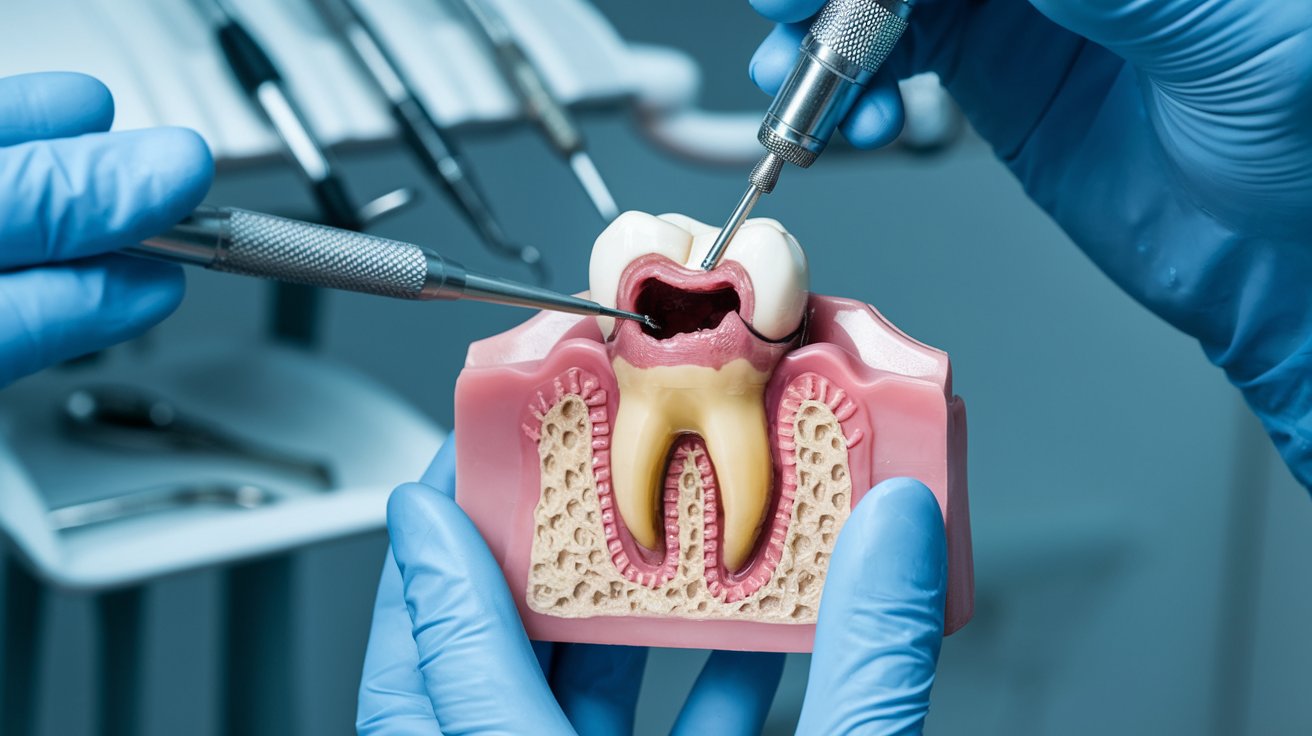Table of Contents
If you’ve recently had a root canal or are considering one, you’re probably wondering, how long does a root canal last? Root canals are known for providing long-lasting relief from pain and preventing further tooth damage. How Long Does a Root Canal Last? In this article, we will explore how long the results of a root canal typically last, the factors that affect its longevity, and how to care for your tooth after the procedure.

What Is a Root Canal?
How Long Does a Root Canal Last? Before we dive into how long a root canal lasts, it’s essential to understand what a root canal is. A root canal is a dental procedure used to treat infection or damage in the pulp (the soft tissue inside your tooth). How Long Does a Root Canal Last? During the procedure, the dentist removes the infected or damaged tissue, cleans the inside of the tooth, and then fills and seals it to prevent further issues.
Why You Might Need a Root Canal
A root canal is usually needed when the pulp inside your tooth becomes infected due to deep decay, a cracked tooth, or trauma. How Long Does a Root Canal Last? Without treatment, this infection can lead to severe pain, swelling, and, eventually, tooth loss. A root canal not only saves the tooth but also relieves pain and restores your ability to chew properly.
Also read: How Does Suboxone Work? Discover the Life-Changing Effects
How Long Does a Root Canal Last?
So, how long does a root canal last? The good news is that root canals are designed to provide long-term results. On average, a root canal can last a lifetime when paired with proper dental care. However, several factors can influence how long the treated tooth remains healthy.
Longevity of the Root Canal Procedure
Once the root canal procedure is completed and the tooth is restored with a filling or crown, it can last for many years—often a decade or more. Many people retain their root canal-treated teeth for the rest of their lives. However, the longevity of the procedure depends on how well you care for your teeth and follow your dentist’s advice.
Factors That Affect How Long a Root Canal Lasts
While root canals are meant to last, several factors can influence their longevity:
- Quality of the Restoration: A well-placed crown or filling is crucial for protecting the tooth after a root canal. A strong restoration can help the tooth last longer by preventing further damage or decay.
- Oral Hygiene: Good oral hygiene, such as regular brushing, flossing, and dental checkups, plays a significant role in the long-term success of a root canal. Poor oral care can lead to new infections, which may require further treatment.
- Location of the Tooth: Root canals on molars or teeth located at the back of the mouth may not last as long as those on front teeth. This is because molars bear more pressure from chewing and grinding, making them more vulnerable to wear over time.
- Follow-Up Care: Regular visits to your dentist for checkups and cleanings help ensure the long-term success of your root canal. If issues arise, they can be detected early and addressed before they worsen.
How to Take Care of Teeth Following a Root Canal
To make your root canal last as long as possible, it’s essential to care for your teeth properly. How Long Does a Root Canal Last? Follow these simple tips to maintain the health of your root canal-treated tooth:
Maintain Good Oral Hygiene
Brushing your teeth twice a day and flossing daily are essential for keeping your teeth healthy after a root canal. Use a soft-bristled toothbrush and fluoride toothpaste to protect your teeth from decay and plaque buildup.
Protect the Tooth with a Crown
If your dentist recommends placing a crown over your root canal-treated tooth, it’s important to follow through. Crowns provide extra protection and help strengthen the tooth, especially if it’s a molar that endures more pressure from chewing.
Avoid Hard or Sticky Foods
In the days following your root canal, avoid hard, sticky, or chewy foods that could put stress on your tooth. Once your tooth is fully restored, you should still be cautious about eating foods that could damage your crown or filling.
Visit Your Dentist Regularly
Routine dental checkups are key to maintaining the health of your root canal-treated tooth. Your dentist can monitor the tooth to ensure it stays healthy and provide professional cleanings to remove plaque and tartar that brushing and flossing can’t reach.
Signs That Your Root Canal Needs Attention
How Long Does a Root Canal Last? While root canals are meant to last for many years, complications can arise if the tooth becomes damaged or infected again. Here are some signs that your root canal-treated tooth may need further attention:
Persistent Pain or Sensitivity
If you experience pain or sensitivity in the tooth that was treated, it could indicate that the root canal wasn’t entirely successful or that the tooth has become reinfected. Please make an appointment with your dentist right once to have it assessed.
Swelling or Tenderness
Swelling or tenderness around the tooth is another sign that there could be an issue. This could be due to infection or inflammation that requires further treatment.
Cracks or Damage to the Tooth
If the tooth cracks or the crown becomes damaged, bacteria can enter the tooth and cause a new infection. It’s important to get any damage repaired quickly to prevent further complications.
Can a Root Canal Fail?

Although root canals are very successful, they only sometimes work. How Long Does a Root Canal Last? Understanding the reasons behind root canal failure can help you take steps to prevent it.
Causes of Root Canal Failure
Root canals can fail for several reasons, including:
- Missed Canals: If a root canal has more than one canal and one is missed during the procedure, it could lead to infection later.
- Incomplete Cleaning: In some cases, the infected tissue may not have been fully cleaned out, which can cause pain and reinfection.
- New Decay: If new decay forms around the filling or crown, it can compromise the treated tooth and lead to failure.
How to Handle a Failed Root Canal
If your root canal fails, your dentist may recommend retreatment. Retreatment involves:
- Reopening the tooth.
- Removing the existing filling or crown.
- Cleaning the canals again.
- Resealing the tooth.
In more severe cases, surgery or tooth extraction may be necessary.
How long does a root canal last? With the right care, root canals can last a lifetime, providing relief from pain and protecting your tooth for many years. Factors like oral hygiene, restoration quality, and regular dental visits play a crucial role in ensuring the long-term success of a root canal. How Long Does a Root Canal Last? By taking good care of your teeth, you can enjoy the powerful, lasting results of your root canal for decades to come.

